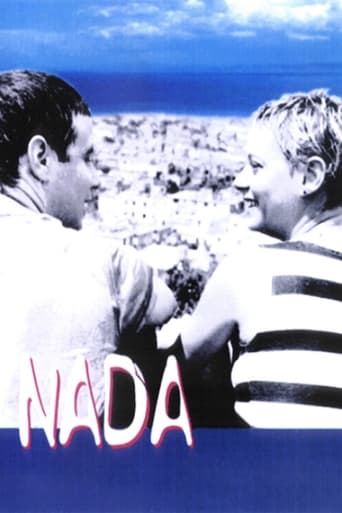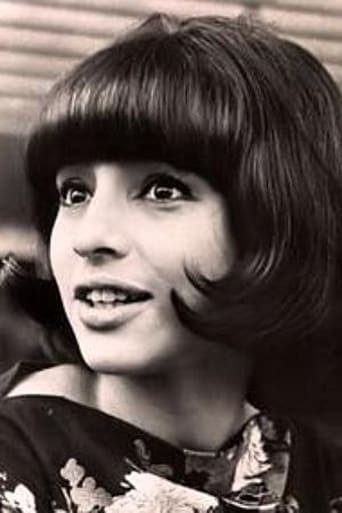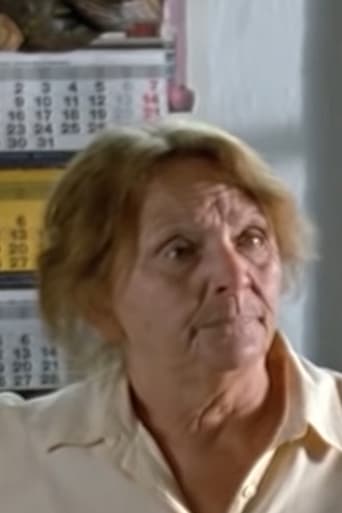

Nada+ (2001)
Carla, a young postal worker in Havana, spends her days postmarking thousands of letters and dreaming of the day when she can be reunited with her parents, who moved to Miami when she was fifteen. To fulfill her longing for intimacy, she opens random letters and rewrites them into lyrical prose, believing she is helping her fellow Cubans understand one another better. Beautifully filmed in black and white accented by brilliant colours, Nada+ has a stunning visual composition. With its delightful mix of visual humour, theatrical characters, satire and a lighthearted love story, it has a distinctly Cuban flair.
Watch Trailer
Cast


Reviews
Carla, a young woman living alone in Havana, has a thankless job in a local post office. She is the one responsible for canceling the stamps in all the letters that are deposited in that branch. She also has an knack for selecting different letters that "speak" to her. When she opens them, she transforms the text. Where there was despair, she writes a hopeful message; where there is loneliness, she is a solace for the one that will receive it. Even for a television personality she is instrumental in changing one of the letters that criticize him into a loving poem that when he reads it on his program, is an instant success.This young woman has won the visa lottery to go to the United States, where her parents are now living. At the beginning of the story, all she wants to do is get away from the monotony of her lonely life and go join her family in Miami. Fate intervenes in the form of Cesar, one of the letter carriers. He is young and begins to see that in spite of Carla's problems at work and in her personal life, she is worth pursuing.There are different interpretations about the Cuban realities in the film. One can see certain things in which some of the country's problems are seen by Carla, her co-workers, and even by her nosy neighbor. Carla wants to help others, but she hardly can help herself. When the new manager arrives, she sees right through her employee that something funny is happening. At the end, Carla receives the exit permit and we watch her take a taxi to the airport, but we realize she is not going anywhere.The film is a light comedy directed by Juan Carlos Cremata Maberti, who also co-wrote it and contributed to the editing of the film. Shot in black and white, it incorporates certain color elements to emphasize what's happening in a particular scene. Thus, we see the yellow pencil used by Carla, as well as the many colors of her Tiffany lamp, the gold fish in the glass jar, the yellow taxi, the butterfly and the rainbow at the end of the film while the background is always black and white.Thais Valdes plays Carla with stoic determination. She doesn't express much, making this enigmatic woman into somebody that is playing magic behind what she writes in the letters. Daisy Granados, a veteran actress of the Cuban cinema appears as Cunda, a manager from hell. Nacho Lugo is seen as Cesar and the delightful Paula Ali has some funny moments as the office spy.This film shows a new director in the Cuban cinema. Juan Carlos Cremata Maberti shows he has an innovative way for telling his story and has gathered an interesting team to work on it.
Nada+ "Nada+" (Nothing More) is the latest in a series of Cuban films such as "Strawberries and Chocolate" and "The Waiting List" that satirize bureaucracy. Such films are the most effective rebuttal to claims in both the conservative and liberal press that Cuba is a totalitarian dungeon. Indeed, "Nada+" is irrefutable evidence that the main challenge to bureaucratic stupidity and oppression comes from the government itself, since without government funding such films would never see the light of day.What better symbol of bureaucracy is there than the post office, which serves as the setting for "Nada+." Carla Perez (Thäis Valdés) is a young, beautiful and supremely bored clerk who spends each day rubberstamping incoming mail while listening to music on a portable radio at her desk.To relieve the tedium, she has begun to steal letters in order to get into the lives of the writers, who function as characters in soap operas for her. Taking things one step further, she begins to write back letters to the sender in the name of the original recipient. But her letters are more compassionate, more loving and more sensitive than anything that they would be capable of, with an impact that is often highly dramatic.One of the unsuspecting recipients is a Cuban equivalent of Doctor Phil, who has an afternoon talk show proffering advice to the unhappy, but he himself is far more tormented than any of his callers. He throws a tantrum one day at Carla's office when no letters are found in his mailbox, accusing the workers of stealing his mail. In this instance, however, Carla had nothing to do with it. Taking pity on him, she decides to write him a fan letter assuming the identity of one of his viewers. So deeply moved is he by her words that he confesses to his audience that he has been living a lie, tears off his toupee and attempts to strangle himself with a microphone cord!
While the film-maker kept insisting this film is "nothing" I found it a brilliant piece of art. Filmed in black and white, but with certain items, emblems, and images in vibrant color, this film speaks volumes through it's manipulation of the art of film to say "nothing".It is pure farce, poignant drama, and slapstick comedy all rolled into a love poem to Cuba.While nothing in Nada should be taken too seriously, it never once panders to its audience with simple cheap laughs. Well, ok, some characters are certainly intended as pure caricatures, which others have rightly identified as in the style of "commedia d'ell arte". This is part of the film's joy. This is not to say that the film doesn't have some poignant moments.Nada is the story of a bored and lonely postal worker in Havana named Carla who decides to play God with the letters that pass through her hands. Through a twist in fate, a spilled bit of coffee, Carla happens upon the world of the letter writers, those whose mail she mindlessly stamps "priority" on a daily basis. Suddenly she is confronted with the sadness and loneliness of not just her own life, but the world outside. For a lark she decides to re-write the letter ruined by the coffee spill, but instead of re-writing it as it had been written, she alters it.In one of it's more brilliant and moving moments; using truly mesmerizing camera work, we listen as Carla re-writes a letter to a woman bent on ending her life. The woman's long flower patterned dress is in color. We follow this woman into an old empty house; following at a distance, as she finds her way to the bath. Carla has written her about the need to live life with a passion, and not to live simply a long life. We watch as the woman disrobes, and then slips into the bath tub, disappearing from the screen, the camera moves in slowly towards the tub. This deliberate and slow movement heightens the melodrama unfolding. Has she just climbed into an empty tub? Is this her way of ending an un-lived life? I won't spoil this moment here, you should see it for yourself.The amazing thing about this moment, is that, as different as it is from much of the rest of the film, it doesn't feel out of place. Nor does the moment as we listen to Carla's re-write of a letter from a daughter to her father. We watch this man, thinking about the letter he has just read, as he moves slowly to the sea wall, the camera first facing him, and then slowly moving up over, and then behind him to look out to the sea with him. We don't linger, but the point has been made, for during this high tracking shot over him we have been listening to Carla's voice tell us of the love this daughter holds for her father, even while she hasn't seen him for years.But again, Nada never takes itself seriously, it isn't about anything (please read a wry smile here). And soon we are always back to some silly moment with the nosy bureaucrats in the Post Office, or the noisome, neighbor. And finally Nada fulfills itself as a love story between Carla and Cesar, a fellow postal worker she enlists in her efforts to change the world around her.Juan Carlos Cremata Malberti indicated at the SFIFF where I saw it, that Nada is the first of a trilogy he plans to make. For a first feature that can be both subtle at one moment, and hit you with a sledge-hammer the next I only hope the wait is very short.
Although this has been called an over-the-top story some of the writing is done very passionately. I particularly enjoyed the letter being read while a women was taking a bath. I wish some of this passion could be present in more North American movies. Thais Valdes is an excellent actress and hopefully she can get more roles in movies like this in the near future. The satire with the bureaucracy in the mail office is dead on.



